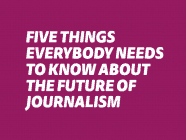Determining the relationship between journalism and politics often amounts to a chicken-and-egg-situation: Who drives whose agenda? Is it media outlets dictating the news of the day or is it politicians and their spin doctors manufacturing the news?
Focusing on election campaigns in Austria, a new study in Journalism Practice examines the interdependence between media outlets and political parties and how it changed over the last four decades. Joseph Seethaler and Gabriele Melischek, both with the Institute for Comparative Media and Communications Studies at Austrian Academy of Sciences, looked at five election campaigns between 1970 and 2008 and analyzed whether, and to what extent, political campaigns set the agenda for news reporting.
Their findings suggest a significant change in the relationship between news outlets and political parties. While in the 1970s the media mainly served as “conduits for party agendas,” they became more autonomous by 2008 “acting as agenda setters for the parties.”
Seethaler and Melischek undertook a content analysis examining 6200 news releases by Austrian parliamentary parties and about 13700 news stories by Austrian news outlets. They analyzed the main evening newscasts and the political coverage of both quality and tabloid papers.
The authors point out that their Austrian results are in accordance with a larger trend of a “mediatization of politics,” a worldwide process in which media demands set the parameters for political communication over the last decades. As Seethaler and Melischek argue, politicians and political parties not only adapted this media logic but ultimately adopted it. As a result, the relationship has become a reciprocal one: journalists follow leads from political parties while political parties take cues from the media.
This powerful role of the media in determining campaign issues keeps political interests in check. Yet, this logic comes with its own set of limitations. As Seethaler and Melischek observe for the Austrian election campaign in 2008, “[s]hort-term opportunist exploitation of currently hot, high-profile issues gained in importance. In most of the cases, parties only managed to take hold of headlines and not to shape media agendas as a whole (as in prior times).”
Photo credit: European Parliament / Flickr Cc
Tags: Austrian Academy of Sciences, Gabriele Melischek, Institute for Comparative Media Communications Studies, Joseph Seethaler, media, Media studies, mediatization, Politics, Research











































